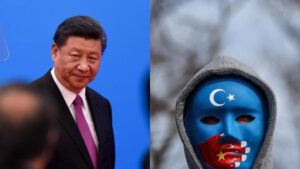A Chinese ex-police detective turned whistleblower says Uighur Muslims were tortured, ordered to be raped by fellow prisoners, and hanged from cell ceilings after being rounded up in a ‘social cleansing’ program.
Uighur Muslims were tortured, ordered to be raped by fellow prisoners, and hanged from cell ceilings as part of China’s “re-education” program in Xinjiang province, says a former Chinese police officer.
In what appears to be the first eyewitness testimony by a Chinese official, the former detective spoke to the CNN about the extreme abuse used to extract ‘confessions’ from around 2 million Uighurs rounded up by the Chinese state.
Speaking from an undisclosed location in Europe the man, identified only as Jiang, said he worked in one of hundreds of brutal internment camps scattered throughout far-western China.
Jiang said he was initially an enthusiastic supporter of the Chinese crackdown on the Muslim Uighur ethnic group, joining 150,000 police tasked with staffing detention centres in Xinjiang province.

In the interview he said every new detainee was beaten during their first interrogation to obtain a confession – including men, women and children as young as 14.
Jiang said he and his colleagues would “kick them, beat them [until they’re] bruised and swollen” and “until they kneel on the floor crying”.
Other torture techniques used included waterboarding, sleep deprivation and hanging from ceilings for days, as well as China’s “tiger chair” in which a subjects hands and feet are tied to a chair – sometimes for days.
Jiang also described using electric batons on prisoners.
“If you want people to confess, you use the electric baton with two sharp tips on top,” he also said in the interview. “We would tie two electrical wires on the tips and set the wires on their genitals while the person is tied up.”
Another common tactic included forcing prisoners to gang rape their fellow male detainees.
“Everyone uses different methods. Some even use a wrecking bar, or iron chains with locks,” Jiang said. “Police would step on the suspect’s face and tell him to confess.”
The torture in police detention centres stopped only when the suspects ‘confessed’ at which time they were transported to one of hundreds of internment camps – referred to as “vocational training” centres by Beijing.
Jiang also described the tactics used by police officers as they swept Uyghur communities in Xinjiang.
Packs of police officers armed with rifles went house to house pulling people from their homes before handcuffing and hooding them.
They would threaten to shoot the arrestees if they resisted.
“We took (them) all forcibly overnight,” he said. “If there were hundreds of people in one county in this area, then you had to arrest these hundreds of people.”
Those rounded up were accused of terror offences, but Jiang believes “none” of the hundreds of people he arrested had committed a crime.
“They are ordinary people,” he said.
Jiang was deployed “three or four times” to work in Xinjiang during the height of China’s Strike Hard anti-terror campaign.
He said he was eager to travel to Xinjiang to help defeat terrorism. His boss when asking him to take the posts, told him “separatist forces want to split the motherland. We must kill them all.”
Strike Hard against Violent Terrorism was launched in 2014 and focused on the mass detention of Uyghurs in Xinjiang.
The Chinese authorities have repeatedly framed the crackdown as an anti-terror counterinsurgency in order to justify its efforts to crush separatist unrest in Xinjiang and have denied the existence of human rights abuses there.
“I want to reiterate that the so-called genocide in Xinjiang is nothing but a rumor backed by ulterior motives and an outright lie,” said Zhao Lijian, Chinese Foreign Ministry spokesman, during a news conference in June.
The US State Department has estimated that as many as two million Uyghurs and other ethnic groups have been detained in camps in Xinjiang since 2017.
Former detainees say the facilities are designed for mass re-education where inmates are forcibly taught Mandarin and instructed in Communist Party propaganda.
Some testimonies from former detainees – and now from the ex-policeman Jiang – describe overcrowded cells, torture and even the deaths of their fellow detainees.
Along with the mass detentions Uyghurs have been subject to extensive controls and restrictions imposed on their religious, cultural, economic and social lives.
This has seen an expansion of police surveillance to monitor signs of ‘religious extremism’ that include growing a beard, having a prayer rug, or owning books about Uyghurs, and has extended to installing cameras in the homes of private citizens.
To verify his testimony Jiang showed CNN his police uniform, official documents, photographs, videos, and identification from his time in China.
CNN has submitted questions to the Chinese government about his accusations but has not received a response.
From his new home in Europe, the former police officer says he is struggling to deal with his role in Xinjiang, and is haunted by the camp system he participated in.
He feels he is close to a lockdown.
“I am now numb,” Jiang said. “I used to arrest so many people.”
Saying he will never return to China because he will be ‘arrested’ Jiang hopes those he arrested, beat, abused and tortured can forgive him.
“I am guilty, and I’d hope that a situation like this won’t happen to them again,” Jiang said. “I’d hope for their forgiveness, but it’d be too difficult for people who suffered from torture like that.”
“How do I face these people?” he added. “Even if you’re just a soldier, you’re still responsible for what happened. You need to execute orders, but so many people did this thing together. We’re responsible for this.”



